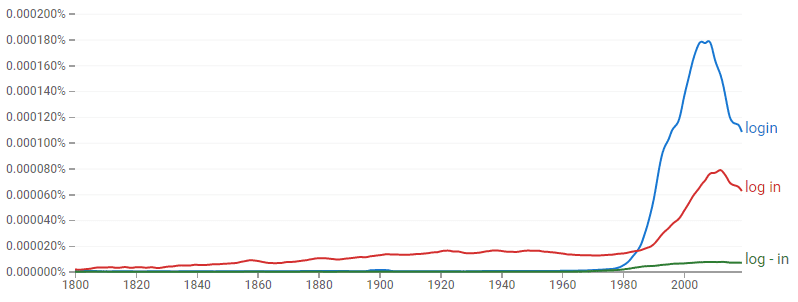Login, spelled as one word, is only a noun or an adjective. For example, the information you use to sign in to your email is your login (noun), and the page where you sign in is the login page (adjective). Log in is two words when it functions as a verb. For example, you log in with your login information.
Origins Of Use And Modern Interpretations
The origination of log in can be read as to log into. The word log has been used in a nautical sense for hundreds of years and is a shortened version of the logbook or ship’s journal that records the events, cargo, and coming and goings of people within the ship. The phrase has long been used as an action to log information in this manner.
Login and log-in are different spellings of the same meaning. They are derived from a more modern, technological age that refers to using a password and username while logging into a computer or system. Neither use made its way into writing until the late 1970s, corresponding to widespread growth and familiarization with the technologies.
Log In Definition and Use
Log in is a phrasal verb that defines the action of logging into something. This is an old phrase that dates back to ship’s logbooks and has easily carried forward into modern times to mean the same action: to record information or document your activities.
According to Merriam-Webster, the more modern definition is to establish communication and initiate interaction with a computer or system. In each instance, a log, or list of your communication, is being recorded and stored, similar to using the original logbooks on a ship.
Plural and Tense Use
As with most two-word phrasal verbs, the -s for plural usage, and -ed or -ing for tense stays with the first word.
Examples include:
- He logs in on the company website to record his hours for his paycheck.
- She logged in to the computer to finish her essay for school.
- Logging in early to work helped him avoid distractions.
Login and Log-In Definition and Use
Login and log-in are two forms of the same word and use. And unlike the phrase log in, login serves as either a noun or adjective and refers to the actual information used for digital access interaction with an account or system. This describes a code, username, password, or combination of information you used to initialize data.
The hyphenated form is not as well used and will most likely drop off even further, even though some publications hold its use as a standard.
Examples include:
- Her login information was hard to remember, so she kept it in a pocket in her purse.
- His login provided him access to the Internet bank accounts to check the balances.
- The log-in code for his email was easy to remember since it was similar to his dog’s birthday.
- To enter the log-in, she had to first boot up the system and turn on the display.
To see other one-word phrase equivalents that function as nouns and adjectives, see check up and checkup, pay back and payback, and run away and runaway. You might also be interested in log on vs. log in.
What’s the Difference Between Login, Log in, and Log-in? Using Them in a Sentence.
Log in (verb)
Users log in and are presented with a selection of plays, concerts and other events for that night only. [Wall Street Journal]
Login (noun and adjective]
Most online fraud prevention solutions focus on two transactional activities. The first is the login to a storefront or website [Forbes]
The firm sent out a “large number” of emails this morning requiring members to change their login details. [Telegraph]
Hyphenated
These editions come with faster processors and separate log-in accounts so multiple children can share the same device. [New York Times]
[P]references in the Modern layout were automatically saved and transferred to multiple machines with a single log-in. [Denver Post]
Let’s Review
If you had been wondering if log in was one word or two, hopefully this explains it more clearly. Log in is an action you take to record or enter information. Login is a noun or adjective to describe the information or data you are entering into something. Log-in is simply login with a hyphen.

